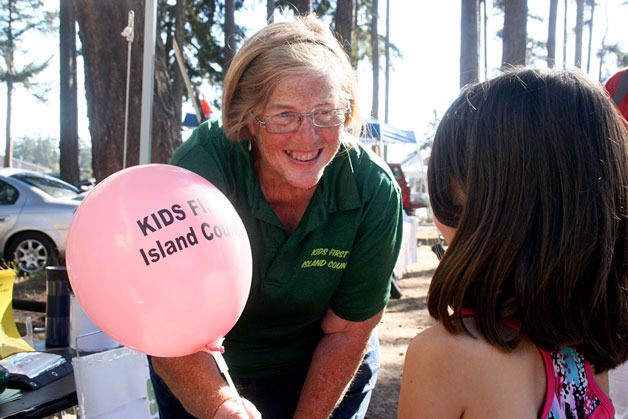Like many foster parents, back-to-school shopping for Amanda Castellano poses more challenges than just tracking down everything on her child’s school supplies list.
As a parent to four foster children plus two of her own, Castellano says it is difficult to stretch a budget across the needs of multiple children, needs that foster parents are often left alone to meet.
In fact, the notion that Castellano’s kids might get more than one new pair of shoes or outfit for school seemed unrealistic, if not impossible, until three weeks ago.
That’s when Castellano received a flyer introducing a back-to-school clothes program for foster children.
Aimed at providing every school-aged foster child in Island County with a $150 for clothing, Castellano said she was in disbelief about what the program was offering until she received the gift cards for her foster children.
“It was, like, a relief, it took a weight off our shoulders because you want all of your children to go to school feeling confident and proud of themselves.”
“You want all of them to feel like they’re special, just like every other kid feels special on the first day of school,” she said.
“It’s a really emotional feeling when you’re given a way to do that.”
The gift card program is the brainchild of the local nonprofit organization Kids First Island County. It was launched just a month ago.
Established in 2009, the organization itself coordinates partnerships throughout the community to fulfill the unmet needs of foster children.
Volunteer Linda Abbott said the needs of foster care children tend to be things that foster parents or government resources are unable to provide, but that make a significant difference in a child’s ability to cope with transitioning into foster care.
Kids First receives formal requests throughout the year for such things as sports equipment, musical instrument rentals and help with fees for after-school activities, swim lessons and day camps.
“All those types of things are needs that all children have, but that foster children might miss out on because they just don’t fit into the budget,” Abbott said.
For volunteer Shelly Lewis, the requests are often for little things that someone might not normally consider difficult to provide.
When fees, equipment or other needs cannot be met, she said foster children may miss out on important social activities that make them feel included.
New clothing for school is one such request that consistently arises throughout the year, Abbott said.
“Kids First always ensures that there are no duplications in terms of services, meaning we’re not providing something other agencies can assist with,” she said. “But often clothes provided to kids in foster care are hand-me-downs or from thrift stores.”
“There are few options for new clothes.”
Lewis said that foster children receive only a small, one-time voucher from the state to meet needs such as clothing. The amount is usually about $100 for the duration of a child’s stay in foster care.
With children often in foster care for about a year, the need for clothes is immediate and can be overwhelming, she said.
Abbott said Kids First volunteers believe there are approximately 55 children in foster care in Island County and has distributed 28 gift cards.
With some children under school age and others yet unidentified, Abbot said the organization is hoping to reach the remaining children through social workers, court-appointed special advocates and foster parents.
Because of confidentiality rules, Kids First must rely on outreach to spread the word, including at the Oak Harbor Farmer’s Market.
If foster parents want to receive a gift card, all they have to do is contact the organization.
“If we didn’t have the support of the community, we wouldn’t be able to do it,” Abbott said. “We just want kids in foster care to know that there is a community out here that cares about them.”
For Castellano, the organization and program is doing exactly that for her foster children.
“For them to have a choice on what they like, they were really excited about it and it really makes their confidence higher,” Castellano said. “For them to be able to go and pick out what they actually wanted was really big for them because it wasn’t ‘this is what we have’ it was ‘what would you like?’”
The program, Castellano said, gives foster children something rare — a freedom of choice.



